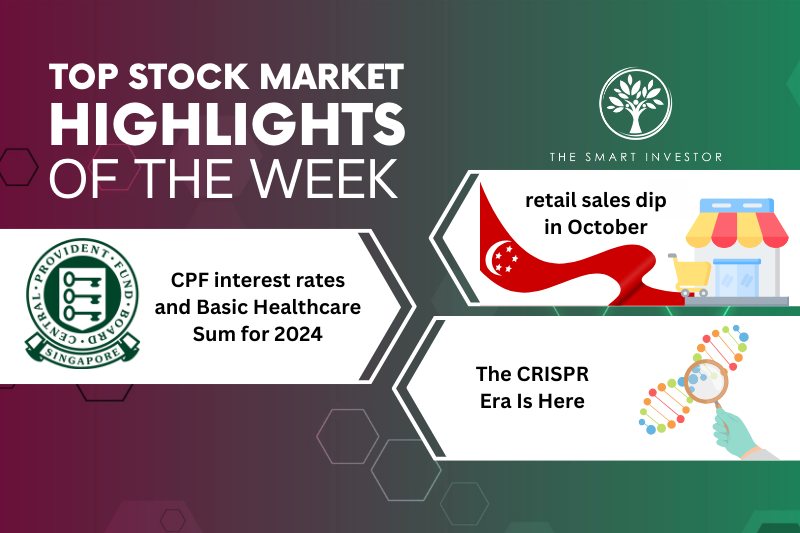Welcome to the latest edition of top stock market highlights.
Singapore retail sales
Retail sales in Singapore saw a slight 0.1% year-on-year dip in October.
This decline breaks an eight-month streak of increases.
September 2023 saw retail sales increase by 0.7% year on year.
Economists from United Overseas Bank (SGX: U11) attribute the lacklustre performance to a slowdown in the pace of recovery in tourist arrivals, particularly from China.
In addition, wage growth is moderating while job uncertainty is also increasing, thereby exerting further downward pressure on retail sales in the coming months.
In terms of industries, food and alcohol saw the sharpest increase for October of 22% year on year with watches and jewellery coming in second at 6.1% year on year.
The sharpest fall was in recreational goods and furniture & household equipment, with year-on-year declines of 8.1% and 7.5%, respectively.
Despite the dip, economists remain sanguine for 2024 as Singapore’s inbound tourism recovery remains intact and should see a complete recovery by next year.
Some cushion will also arrive in the form of the government’s Assurance Package given out this month along with Community Development Council vouchers to be disbursed in January 2024.
CPF interest rates
There is more good news for Central Provident Fund (CPF) savers.
The interest rate for the CPF Special, Medisave and Retirement (SMA) accounts will rise to 4.08% for the first quarter of 2024.
This SMA rate increase is the third consecutive increase as it is pegged to the 12-month average yield of the 10-year Singapore Government Securities.
The first increase was in the third quarter of 2023 when the interest rate inched up to 4.01%, followed by 4.04% in the current quarter.
However, the interest rate for the Ordinary Account (OA) will remain unchanged at 2.5% as the pegged rate here remains below the floor rate of 2.5%.
As a reminder, the government will pay an additional 1% interest on the first S$60,000 of combined balances across the OA and SMA, capped at S$20,000 for the OA, for CPF members below the age of 55.
Members aged 55 and above will enjoy a 2% additional interest on the first S$30,000 of combined balances with an extra 1% on the next S$30,000, also capped at S$20,000 for the OA.
The promise of CRISPR
The United Kingdom (UK) has approved the very first medical treatment that utilises CRISPR gene editing.
The therapy will be sold as Casgevy and is for patients suffering from inherited diseases sickle cell anaemia and a related blood disorder called beta thalassemia.
This CRISPR treatment was developed by Vertex Pharmaceuticals (NASDAQ: VRTX) and Crispr Therapeutics AG (NASDAQ: CRSP) and involves editing a patient’s cells outside the body and infusing them back in.
Casgevy will prevent episodes of extreme pain experienced by sickle cell sufferers and free people with beta thalassemia of regular blood transfusions.
CEO of Crispr Therapeutics, Samarth Kulkarni, asserts that Casgevy is just the tip of the iceberg and that there will be a lot more CRISPR therapies coming up.
CRISPR works by making permanent, targeted cuts in a person’s DNA and is being investigated for potential use in treatments for other genetic conditions, certain types of cancer, and even AIDS.
Both Europe and the US are poised to approve the CRISPR therapy with an advisory committee to the US Food and Drug Administration concluding that the treatment was safe for patients.
Sickle cell disease makes a person’s blood cells hard and crescent-shaped, thus giving the disease its name.
These abnormal cells clump together and die off early, causing anaemia, or a lack of red blood cells within the body.
As for beta thalassemia, it also causes anaemia as the body produces less haemoglobin than usual. Haemoglobin is the vital protein found in red blood cells that helps carry oxygen throughout the body.
A trial run by both companies saw 28 out of 45 sickle cell patients treated with Casgevy being free of pain crises at least a year after treatment.
Of the beta thalassemia patients, 39 out of 42 that were followed post-treatment did not require a blood transfusion for at least a year.
Both trials are still ongoing but scientists are confident that these effects could last years or even decades as CRISPR is designed to permanently alter the genome, thus producing something akin to a cure for these genetic conditions.
Attention: Investors aiming for both growth and peace of mind. We’ve pinpointed 5 SGX stocks known for consistent dividends. If you want to build a retirement portfolio, but don’t want the stress of stock watching, this report is for you. Click HERE to download now.
Follow us on Facebook and Telegram for the latest investing news and analyses!
Disclosure: Royston Yang does not own shares in any of the companies mentioned.

